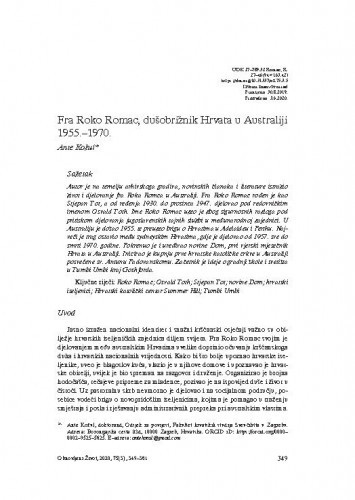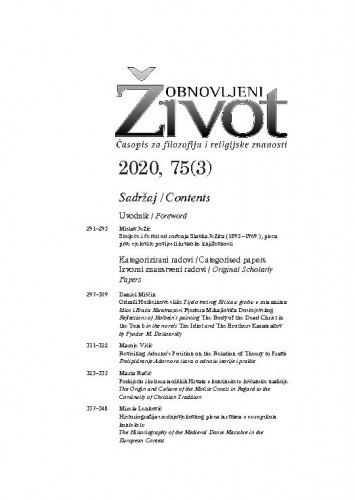Autor je na temelju arhivskoga gradiva, novinskih članaka i literature istražio život i djelovanje fra Roka Romca u Australiji. Fra Roko Romac rođen je kao Stjepan Tot, a od ređenja 1930. do prosinca 1947. djelovao pod redovničkim imenom Osvald Toth. Ime Roko Romac uzeo je zbog sigurnosnih razloga pod pritiskom djelovanja jugoslavenskih tajnih službi u međunarodnoj zajednici. U Australiju je došao 1955. te preuzeo brigu o Hrvatima u Adelaideu i Perthu. Najveći je trag ostavio među sydneyskim Hrvatima, gdje je djelovao od 1957. sve do smrti 1970. godine. Pokrenuo je i uređivao novine Dom, prvi vjerski mjesečnik Hrvata u Australiji. Inicirao je kupnju prve hrvatske katoličke crkve u Australiji posvećene sv. Antunu Padovanskomu. Začetnik je ideje o gradnji škole i svetišta u Tumbi Umbi kraj Goshforda.; The life and work of Friar Osvald Toth/Roko Romac were marked by numerous challenges and constant uncertainty. His ecclesiastical activities were banned by the government of the Kingdom of Yugoslavia; the Partisans tried to kill him during WWII, while the post–war Yugoslav authorities put him on the list of wanted war criminals. He ministered as a priest in the Banovina region which had a mixed Croatian Catholic and Serbian Orthodox population, then in Germany among Croats who were used as forced labor and also in the refugee camps of Italy. Fearing extradition to Yugoslavia and being in imminent danger of death, he changed his name and went far from his homeland, via Argentina to Australia. He left his greatest mark among the Croats of Sydney and the surrounding area, where he served for the longest period of time, namely from 1957 to 1970. There he launched and edited the newspaper, “Dom”, the first monthly religious newspaper of the Croats in Australia; he initiated the purchase of the first Croatian Catholic Church in Australia and dedicated it to St. Anthony of Padua; he placed a great importance on young people, especially their education; in Tumbi Umbi he started a big construction project for a school and sanctuary dedicated to the Mother of God. It was during his pilgrimages to Marian shrines that he found strength and refuge from Yugoslav accusations before Australian authorities. Blessed Alojzije Stepinac played an important role in his life and served as a role model for those unjustly accused and persecuted, yet steadfast in preserving and spreading the Christian spirit and national values.
Sažetak

 Obnovljeni život : časopis za religioznu kulturu : 75, 3(2020) / glavni urednik Tadija Milikić.
Obnovljeni život : časopis za religioznu kulturu : 75, 3(2020) / glavni urednik Tadija Milikić.